Unit 6 Go With Transportation ! Unit Review 课件(27张ppt)
文档属性
| 名称 | Unit 6 Go With Transportation ! Unit Review 课件(27张ppt) |
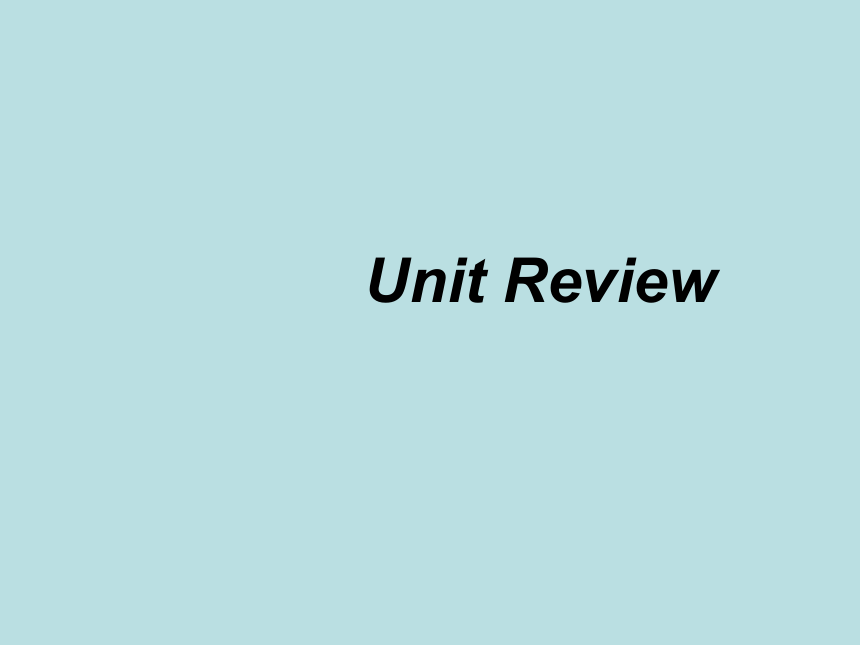
|
|
| 格式 | ppt | ||
| 文件大小 | 314.0KB | ||
| 资源类型 | 教案 | ||
| 版本资源 | 冀教版 | ||
| 科目 | 英语 | ||
| 更新时间 | 2021-11-21 18:28:44 | ||
图片预览



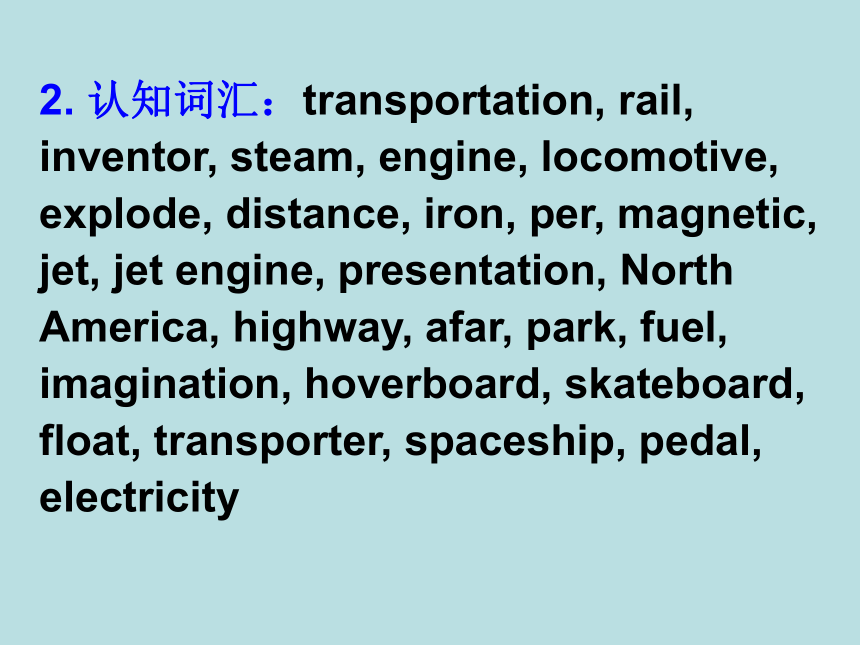
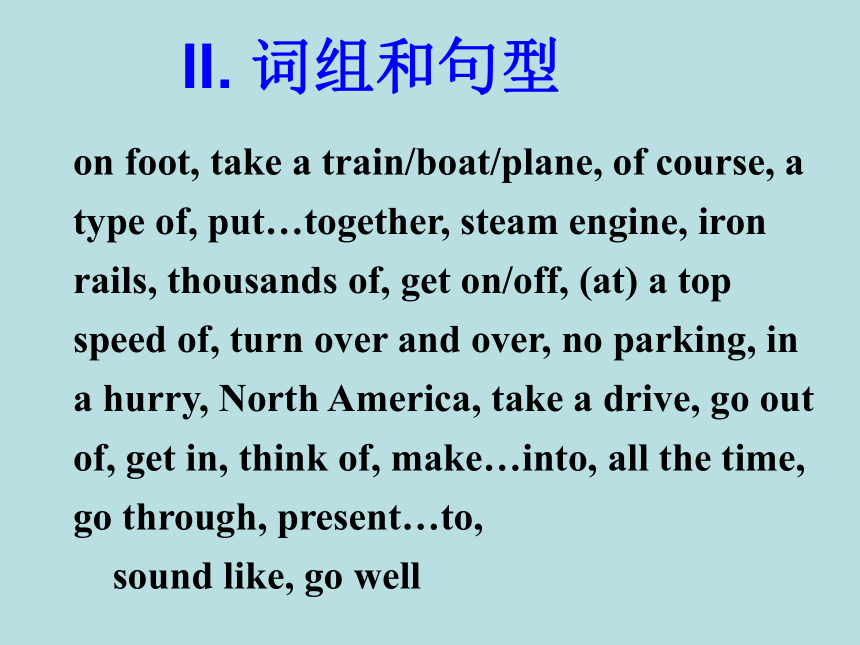
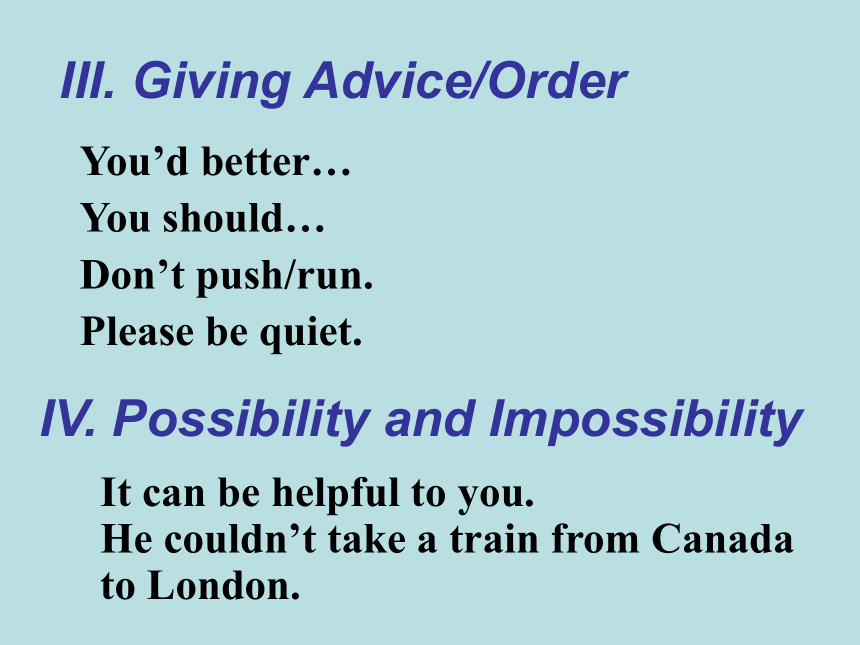
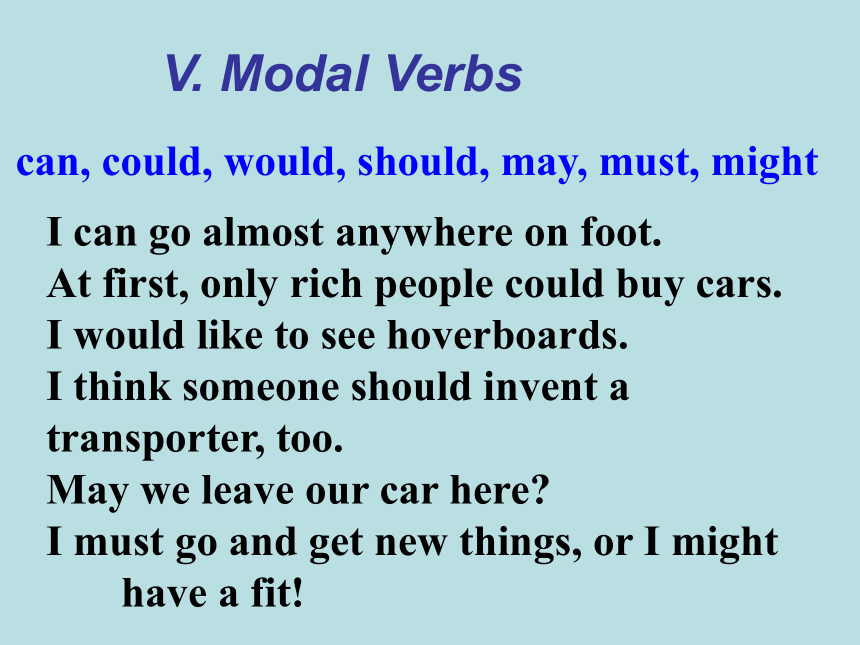

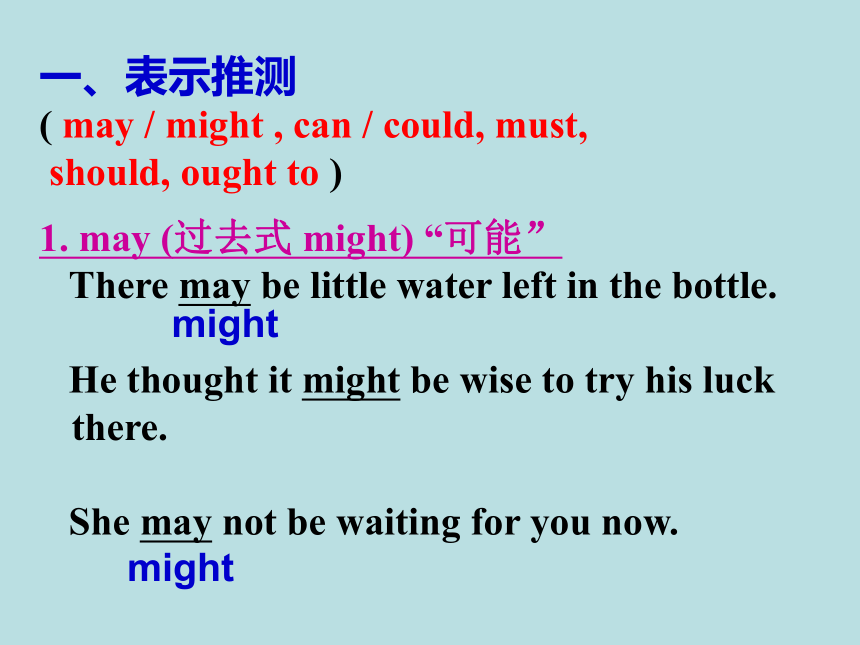
文档简介
(共27张PPT)
Unit Review
Learning aims:
1. Know about the history of some transporters.
2. Learn about the development of the future transportation.
Learning important points:
1. Giving Advice/Order.
2. Possibility and Impossibility.
Learning difficult points:
Modal Verbs
I.词汇
1. 掌握词汇:anywhere, on foot, of course, type, ship, rapid, invent, wheel, engineer, railway, passenger, get on/off, speed, even, certainly, invention, present, round, wing, during, factory, dangerous, humorous, as long as, drive, countryside, ride, get in, smooth, second, space, sound, dirty, electric
2. 认知词汇:transportation, rail, inventor, steam, engine, locomotive, explode, distance, iron, per, magnetic, jet, jet engine, presentation, North America, highway, afar, park, fuel, imagination, hoverboard, skateboard, float, transporter, spaceship, pedal, electricity
II. 词组和句型
on foot, take a train/boat/plane, of course, a type of, put…together, steam engine, iron rails, thousands of, get on/off, (at) a top speed of, turn over and over, no parking, in a hurry, North America, take a drive, go out of, get in, think of, make…into, all the time, go through, present…to,
sound like, go well
III. Giving Advice/Order
You’d better…
You should…
Don’t push/run.
Please be quiet.
IV. Possibility and Impossibility
It can be helpful to you.
He couldn’t take a train from Canada to London.
V. Modal Verbs
can, could, would, should, may, must, might
I can go almost anywhere on foot.
At first, only rich people could buy cars.
I would like to see hoverboards.
I think someone should invent a transporter, too.
May we leave our car here
I must go and get new things, or I might
have a fit!
Language
Points
情态动词
一、表示推测
( may / might , can / could, must,
should, ought to )
1. may (过去式 might) “可能”
There may be little water left in the bottle.
He thought it might be wise to try his luck there.
She may not be waiting for you now.
might
might
注意:
可以用might代替may,以表示说话语气更加不肯定;
may 表示推测时,不能用于疑问句中.如果在疑问句中出现
may,则表示请求许可,意为 “可以”.
May I use your cell phone
注意:
1) 可以用could代替can, 以表示语气婉转;
could
2) 表示推断,can不能用于肯定陈述句,但could可以用于肯定陈述句, 相当于may/might;
This story could be true, but I hardly think it is.
may / might
2. can (过去式could) “可能会”
That can’t be true.
What on earth can this mean
couldn’t
3) can 可以用于肯定陈述句, 表示一时的情况, 意为“有时候会…”;
Our house is on the top of the hill, and in winter the winds can be pretty cold.
4) may not / might not意为 “可能不”, 而can not / could not意为 “不可能” 、 “肯定不”, 其语气要比may not / might not强得多.
3. must “肯定”、 “准是”
You must be joking, aren’t you
注意:
1) must表示推测不用于否定句, 因为must not / must never
只能表示禁止,意为 “不准”、 “不可以”;
--- May I watch TV after supper
--- No, you mustn’t. (may not / can’t 也可 )
Judging by the smell, the food must be good, isn’t it
2) must表示推测不用于疑问句,因为must在疑问句中只能表示 “必须” 或表示反感 “(干吗)偏要…” “硬要” ;
Must I finish it by the end of this week
Why must you ask me so many questions when I’m busy cooking
3) must表示推测不用于将来.应该用别的句型表示推测 “肯定会…” 、 “准会…”.
You’re sure to succeed. / It is certain that you will succeed./ I’m sure that you’ll succeed.
4. should , ought to “照说应当”,
“想比一定”, “按理应该”
Fred should / ought to be up now.
My new poems should / ought to be out in a month at most.
二. 表示必要性,、职责、劝告、建议等 (need, must, should, ought to )
1. need “必需” “需要” ; must “必须”
--- Must I be here before 9 o’clock
--- No, you needn’t. (不能说: No, you mustn’t.)
--- Need I be here before 9 o’clock
--- Yes, you must. (不能说: Yes, you need.)
注意: 1) need作情态动词, 不能用于肯定陈述句, 在陈述句中,应该用need的实义动词表达.
You need to be here before 9 o’clock.
(不能说: You need be here before 9 o’clock.)
2) 回答Must/Need开头的问句, 不能说:Yes, you need./No, you mustn’t.
3) 表示 “必须”时, must 是说话者的主观看法,是积极态度.have to 则是客观需要,是消极态度。
2. 表示建议、劝告. shall, should , ought to , must
You ought to / should follow your teacher’s advice.
You must take plenty of water with you if you want to walk alone into the desert.
Shall we have a break
Let’s have a break, shall we
Let’s not bother him, shall we
三. 请求对方做某事
疑问句中用情态动词can / could , will / would表示请求比用祈使
句表示请求婉转、客气.
Can / Could you wait a few more days
Will / Would you please wait a few more days
四. 表示允许或征询对方许可
may / might, can / could
(“不准许”may not / can’t / mustn’t)
You may / can stay here for the night.
---May / Might / Can / Could I have a talk with you
---Yes, you may / can.
(---No, you may not / can’t / mustn’t.)
(但不说: Yes, you might / could.)
can (过去式could ) / 比较 be able to泛指能力(具有知识、技巧、本领而能读书、游泳、说英语、踢足球等)
五. 表示能力
1. I could / was able to swim well when I was only ten.
2. 如果指过去具体某时或某个场合能(设法)做到某事(succeeded in doing sth. / managed to do sth.),在否定句中两者都可用, 在肯定陈述句和疑问句中,只能用be able to.
We had a holiday yesterday, but couldn’t / weren’t able to go to the seaside.
Exercises
1. There were ______ of footsteps outside the house.
2. The cat came into the house _______ the window.
3. I hope everything ______ well.
4. Mr. Guo is out of ______ now.
5. It ______ two hours to finish my home-work yesterday.
go, sound, take, through, danger
I. 选词填空。
took
sounds
through
goes
danger
1. This book ______ be Lily's. Look! Her name is on the book cover.
2. He's a famous swimmer. He said he ______ swim when he was three.
3. He ______ do it, so can I.
4. You should take your raincoat with you. It ______ rain tonight.
5. —______ I ask you a question
—Yes, you ______.
6. When the traffic lights are red, you ______ stop your car.
II. 用适当的情态动词填空。
must
must
could
can
may
May
can
III. 补全对话。
从方框中选择合适的句子补全对话
(有两项多余)。
A. My bike is broken, too.
B. Walking is good for our health
C. What's wrong with your bike
D. Don't you usually come to school by bike
E. There is something wrong with my bike.
F. That's right.
G. I like walking.
A: Morning, Mr. Wang! You're walking
today. (1)______
B: Yes, I do. But sometimes I walk.
(2)______
A: (3)______, so I like walking, too. Look at the sun. It's a fine day for walking today.
B: (4)______ And the air today is nice and clean. Do you often come to school by bike
A: Yes, but not today.
B: Why not
A: (5)______
E
D
G
B
F
Unit Review
Learning aims:
1. Know about the history of some transporters.
2. Learn about the development of the future transportation.
Learning important points:
1. Giving Advice/Order.
2. Possibility and Impossibility.
Learning difficult points:
Modal Verbs
I.词汇
1. 掌握词汇:anywhere, on foot, of course, type, ship, rapid, invent, wheel, engineer, railway, passenger, get on/off, speed, even, certainly, invention, present, round, wing, during, factory, dangerous, humorous, as long as, drive, countryside, ride, get in, smooth, second, space, sound, dirty, electric
2. 认知词汇:transportation, rail, inventor, steam, engine, locomotive, explode, distance, iron, per, magnetic, jet, jet engine, presentation, North America, highway, afar, park, fuel, imagination, hoverboard, skateboard, float, transporter, spaceship, pedal, electricity
II. 词组和句型
on foot, take a train/boat/plane, of course, a type of, put…together, steam engine, iron rails, thousands of, get on/off, (at) a top speed of, turn over and over, no parking, in a hurry, North America, take a drive, go out of, get in, think of, make…into, all the time, go through, present…to,
sound like, go well
III. Giving Advice/Order
You’d better…
You should…
Don’t push/run.
Please be quiet.
IV. Possibility and Impossibility
It can be helpful to you.
He couldn’t take a train from Canada to London.
V. Modal Verbs
can, could, would, should, may, must, might
I can go almost anywhere on foot.
At first, only rich people could buy cars.
I would like to see hoverboards.
I think someone should invent a transporter, too.
May we leave our car here
I must go and get new things, or I might
have a fit!
Language
Points
情态动词
一、表示推测
( may / might , can / could, must,
should, ought to )
1. may (过去式 might) “可能”
There may be little water left in the bottle.
He thought it might be wise to try his luck there.
She may not be waiting for you now.
might
might
注意:
可以用might代替may,以表示说话语气更加不肯定;
may 表示推测时,不能用于疑问句中.如果在疑问句中出现
may,则表示请求许可,意为 “可以”.
May I use your cell phone
注意:
1) 可以用could代替can, 以表示语气婉转;
could
2) 表示推断,can不能用于肯定陈述句,但could可以用于肯定陈述句, 相当于may/might;
This story could be true, but I hardly think it is.
may / might
2. can (过去式could) “可能会”
That can’t be true.
What on earth can this mean
couldn’t
3) can 可以用于肯定陈述句, 表示一时的情况, 意为“有时候会…”;
Our house is on the top of the hill, and in winter the winds can be pretty cold.
4) may not / might not意为 “可能不”, 而can not / could not意为 “不可能” 、 “肯定不”, 其语气要比may not / might not强得多.
3. must “肯定”、 “准是”
You must be joking, aren’t you
注意:
1) must表示推测不用于否定句, 因为must not / must never
只能表示禁止,意为 “不准”、 “不可以”;
--- May I watch TV after supper
--- No, you mustn’t. (may not / can’t 也可 )
Judging by the smell, the food must be good, isn’t it
2) must表示推测不用于疑问句,因为must在疑问句中只能表示 “必须” 或表示反感 “(干吗)偏要…” “硬要” ;
Must I finish it by the end of this week
Why must you ask me so many questions when I’m busy cooking
3) must表示推测不用于将来.应该用别的句型表示推测 “肯定会…” 、 “准会…”.
You’re sure to succeed. / It is certain that you will succeed./ I’m sure that you’ll succeed.
4. should , ought to “照说应当”,
“想比一定”, “按理应该”
Fred should / ought to be up now.
My new poems should / ought to be out in a month at most.
二. 表示必要性,、职责、劝告、建议等 (need, must, should, ought to )
1. need “必需” “需要” ; must “必须”
--- Must I be here before 9 o’clock
--- No, you needn’t. (不能说: No, you mustn’t.)
--- Need I be here before 9 o’clock
--- Yes, you must. (不能说: Yes, you need.)
注意: 1) need作情态动词, 不能用于肯定陈述句, 在陈述句中,应该用need的实义动词表达.
You need to be here before 9 o’clock.
(不能说: You need be here before 9 o’clock.)
2) 回答Must/Need开头的问句, 不能说:Yes, you need./No, you mustn’t.
3) 表示 “必须”时, must 是说话者的主观看法,是积极态度.have to 则是客观需要,是消极态度。
2. 表示建议、劝告. shall, should , ought to , must
You ought to / should follow your teacher’s advice.
You must take plenty of water with you if you want to walk alone into the desert.
Shall we have a break
Let’s have a break, shall we
Let’s not bother him, shall we
三. 请求对方做某事
疑问句中用情态动词can / could , will / would表示请求比用祈使
句表示请求婉转、客气.
Can / Could you wait a few more days
Will / Would you please wait a few more days
四. 表示允许或征询对方许可
may / might, can / could
(“不准许”may not / can’t / mustn’t)
You may / can stay here for the night.
---May / Might / Can / Could I have a talk with you
---Yes, you may / can.
(---No, you may not / can’t / mustn’t.)
(但不说: Yes, you might / could.)
can (过去式could ) / 比较 be able to泛指能力(具有知识、技巧、本领而能读书、游泳、说英语、踢足球等)
五. 表示能力
1. I could / was able to swim well when I was only ten.
2. 如果指过去具体某时或某个场合能(设法)做到某事(succeeded in doing sth. / managed to do sth.),在否定句中两者都可用, 在肯定陈述句和疑问句中,只能用be able to.
We had a holiday yesterday, but couldn’t / weren’t able to go to the seaside.
Exercises
1. There were ______ of footsteps outside the house.
2. The cat came into the house _______ the window.
3. I hope everything ______ well.
4. Mr. Guo is out of ______ now.
5. It ______ two hours to finish my home-work yesterday.
go, sound, take, through, danger
I. 选词填空。
took
sounds
through
goes
danger
1. This book ______ be Lily's. Look! Her name is on the book cover.
2. He's a famous swimmer. He said he ______ swim when he was three.
3. He ______ do it, so can I.
4. You should take your raincoat with you. It ______ rain tonight.
5. —______ I ask you a question
—Yes, you ______.
6. When the traffic lights are red, you ______ stop your car.
II. 用适当的情态动词填空。
must
must
could
can
may
May
can
III. 补全对话。
从方框中选择合适的句子补全对话
(有两项多余)。
A. My bike is broken, too.
B. Walking is good for our health
C. What's wrong with your bike
D. Don't you usually come to school by bike
E. There is something wrong with my bike.
F. That's right.
G. I like walking.
A: Morning, Mr. Wang! You're walking
today. (1)______
B: Yes, I do. But sometimes I walk.
(2)______
A: (3)______, so I like walking, too. Look at the sun. It's a fine day for walking today.
B: (4)______ And the air today is nice and clean. Do you often come to school by bike
A: Yes, but not today.
B: Why not
A: (5)______
E
D
G
B
F
同课章节目录
- Unit 1 Me and My Class
- Lesson 1 Back to School!
- Lesson 2 Many Faces, One Picture
- Lesson 3 Getting to Know You!
- Lesson 4 Best Friends
- Lesson 5 Meet Ms. Liu
- Lesson 6 Jenny's Week
- Unit 2 My Favourite School Subject
- Lesson 7 Don't Be Late for Class!
- Lesson 8 E-mail Helpers!
- Lesson 9 I Don't Want to Miss Geography !
- Lesson 10 Looking for Lisa
- Lesson 11 Lily Learns about China !
- Lesson 12 Karen's Hair Stood Up!
- Unit Review
- Unit 3 Families Celebrate Togethe
- Lesson 13 I Love Autumn
- Lesson 14 Happy Memories
- Lesson 15 A Present for Li Ming!
- Lesson 16 Happy Thanksgiving!
- Lesson 17 Presents from Canada!
- Lesson 18 Li Ming's Birthday
- Unit Review
- Unit 4 My Neighbourhood
- Lesson 19 The Best Neighourhood
- Lesson 20 No Stopping!
- Lesson 21 Eat a Donut and Turn Right
- Lesson 22 I Like My Neighbourhood
- Lesson 23 People in My Neighbourhood
- Lesson 24 I Need a Map!
- Unit Review
- Unit 5 My Future
- Lesson 25 I Want to Be a Teacher!
- Lesson 26 What Will I Be ?
- Lesson 27 What's Your Advice?
- Lesson 28 Rich or Poor? It Doesn't Matter!
- Lesson 29 Our Ambitions and Dreams
- Lesson 30 A Famous Friend?
- Unit Review
- Unit 6 Go With Transportation !
- Lesson 31 How Do You Travel ?
- Lesson 32 Trains Go Faster !
- Lesson 33 Life on Wheels
- Lesson 34 Flying Donuts
- Lesson 35 Future Transportation
- Lesson 36 Clean Cars ?
- Unit Review
- Unit 7 Enjoy Your Hobby
- Lesson 37 What's Your Hobby ?
- Lesson 38 Hobbies Are Fun!
- Lesson 39 Danny's Hobby
- Lesson 40 What's Paul's Hobby?
- Lesson 41 Show and Tell!
- Lesson 42 The New Club
- Unit Review
- Unit 8 Celebrating Me
- Lesson 43 What Makes You Unique?
- Lesson 44 Georgia Plays Basketball
- Lesson 45 Be Yourself !
- Lesson 46 My Dream
- Lesson 47 I Made It !
- Lesson 48 Li Ming's Report
- Unit Review
